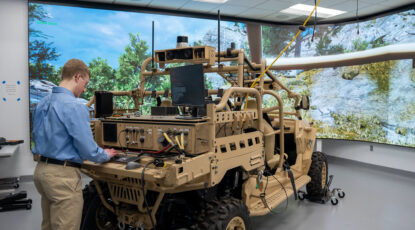Research News
-
Michigan Minds Podcast: Purpose and mattering, featuring John Piette, professor at the U-M School of Public Health
Purpose and mattering. They’re essential to happiness and healthiness, researchers say. But those feelings can be hard to attain, especially for individuals who may be more prone to feeling purposeless. Professor John Piette, director of the U-M Center for Managing Chronic Disease, discusses V-SPEAK, his latest project with U.S. veterans.
-
College athlete unions: Would they be effective?
In a first for college sports, the National Labor Relations Board recently ruled that men’s basketball players at Dartmouth College are school employees and ordered a union vote. Sports economist Richard Paulsen, assistant professor of sport management at U-M’s School of Kinesiology, discusses how unions might look for college athletes.
-
Snakes do it faster, better: How a group of scaly, legless lizards hit the evolutionary jackpot
A large new genetic and dietary study of snakes, from an international team led by University of Michigan biologists, suggests these legless wonders are ‘evolutionary winners.’ Massive shifts in traits associated with feeding, locomotion, and sensory processing have allowed them to be ‘evolutionarily flexible,’ researchers say.
-
Michigan Minds podcast: For lasting fitness, prioritize moving your body — not the numbers on the scale
Though it’s only February, many of the millions of people who resolved to lose weight in 2024 have already fled the dreaded bathroom scale. Focusing primarily (on) the numbers is not an effective way to track our progress, says clinical exercise physiologist Laura Richardson. Start thinking about how you feel, not how much you weigh.
-
Unlocking the secrets of SuperAgers
SuperAgers are showing us it’s possible to enjoy quality cognition as we age, says neuropsychologist Amanda Maher. She is leading U-M’s site for the SuperAging Research Initiative, one of six hubs in the U.S. and Canada studying the biological, genetic, and psychosocial factors contributing to resilient cognition.
-
U-M Biological Station activates snowpack sensor to study changing winters
Increasingly common rain-on-snow weather events are reducing snowpack and washing away nutrients from soils to our streams and lakes. This winter, snow science researchers at U-M’s Biological Station are tracking the snowpack at an hourly rate to get a deeper understanding of the complexities of global environmental change.
-
Food from urban agriculture has surprisingly high carbon footprint
A new U-M-led international study finds that fruits and vegetables grown in urban farms and gardens have a carbon footprint that is, on average, six times greater than conventionally grown produce. However, a few city-grown crops equaled or outperformed conventional agriculture under certain conditions.
-
Off-road autonomy: U-M’s Automotive Research Center funded with $100 million through 2028
The U.S. Army has extended its long-running relationship with the U-M Automotive Research Center, reaching a new five-year agreement of up to $100 million to boost work on autonomous vehicle technologies. As automakers explore self-driving cars, the Army-funded center will figure out how to take the tech off-road.
-
These bubbles kill cancer
“Histotripsy” is a technique created by U-M engineers and doctors that harnesses soundwaves to attack cancer. It comes with the promise of few, if any side effects, a quick treatment time and, for patient Carrie Kumpel, the hope that it would completely destroy three spots that had formed on her liver.










